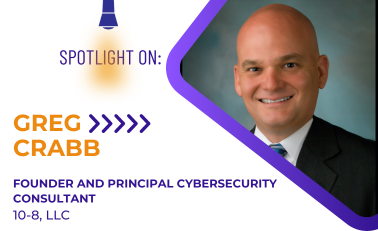
"The quality of my life is the quality of my relationships."
I got into cyber – to protect against the erosion of trust in our technology systems caused by cyber criminals and nation-state adversaries. My career in law enforcement, including my investigations of Russian organized cybercrime, illustrates the ever-evolving and complex nature of cyber threats. Through my experiences, I gained unique insights into the challenges faced by governments, businesses, and society as a whole. It is crucial to build strong public-private partnerships and invest in the training of more information security professionals to protect against these threats and maintain trust in our technology systems.
For me, a positive cyber mindset – involves approaching every situation with a willingness to contribute more than is required or expected. It means being proactive in identifying potential risks and taking necessary steps to mitigate them, as well as sharing knowledge and best practices with others in the industry. Ultimately, a positive cyber mindset is about making a meaningful contribution to the safety and security of our digital world and leaving it better than we found it.
The skill that helped me transition to a career in cyber is – cyber analytics. The ability to manipulate massive amounts of information is a critical skill that is highly sought after in the cybersecurity industry. Data is a digital reflection of human and machine behavior. Cyber analytics is not only about identifying patterns or anomalies but also about leveraging insights gained from data to make proactive decisions that enhance cybersecurity posture. Therefore, honing your cyber analytics skills can help you identify and prevent cyber threats effectively, which is crucial in a world where cyber threats are becoming more sophisticated and frequent.
Transitioning to a career in cybersecurity requires a shift in mindset. It’s important to understand that cybersecurity is not just about protecting technology and computer systems, but rather it’s about understanding the motives and methods of cybercriminals. To be successful in this field, you must go beyond technical skills and learn the psychological, sociological, and behavioral characteristics of your adversaries. This knowledge will allow you to anticipate and prevent cyberattacks, thereby protecting individuals, businesses, and organizations from the impacts of cybercrime. Therefore, it is crucial to recognize that in the world of cybersecurity, the most valuable asset is the understanding of human behavior and relationships.
I would strongly encourage my younger self – to pursue a career in US government service because of the immense satisfaction that comes from protecting the privacy and security of millions of citizens. During my 25-year law enforcement career, I woke up every morning with a strong sense of purpose, knowing that I had a critical role in safeguarding the private communications and package services of 160 million households across America. It was an extraordinary responsibility, but the most rewarding experience of my life.
The quote I live by – “The quality of my life is the quality of my relationships” is not only relevant in our personal lives but also in the cyber world. Building and maintaining strong relationships is crucial for success in the cybersecurity industry. Whether it’s building partnerships with other organizations, fostering relationships with customers, or collaborating with colleagues, strong relationships can lead to better information sharing, improved threat intelligence, and a more secure cyber landscape overall. Just like in our personal lives, investing in positive relationships in the cyber world can lead to a better quality of life, both professionally and personally.
The biggest influencers in my career – were the relationships I developed with Eastern European law enforcement officers, including a Russian spy while working as a federal law enforcement officer. For example, I took risks in sharing investigative information with the Russian FSB and was introduced to Sergey Michalov, the FSB’s deputy head of the information security center. Sergey helped collaborate on addressing international cybercrime. These relationships allowed me to learn how mass surveillance societies like Russia don’t recognize the concept of personal privacy and view the manipulation of technology supply chains to exploit their economies and citizens.
What I most want to be remembered for is – my dedication to protecting American citizens and businesses from cyber threats. Throughout my 25-year law enforcement career, I focused on investigating and combating cybercrime, tracing the origins of Russian organized cybercrime, and contributing to the arrests of international cyber criminals. I forged strong relationships with law enforcement agencies and private industry investigators across the globe to combat the franchising of cybercrime. Later, as the Vice President and Chief Information Security Officer of the US Postal Service, I built a large information security practice to protect the network against cyber threats from nation-states, terrorist groups, and criminals. My career exemplifies the importance of dedicated and skilled information security professionals in protecting our society’s trust in the systems we rely on.